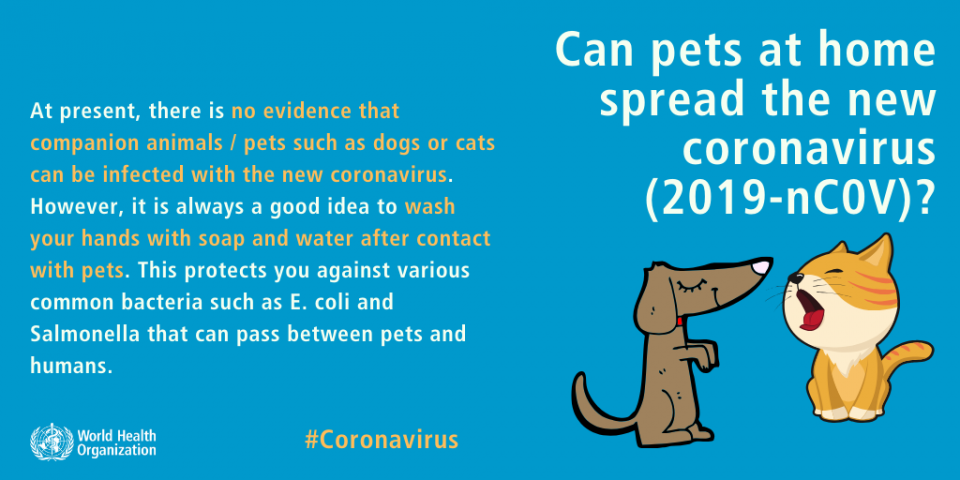The emergence of the new coronavirus has caused fears of a spiraling worldwide health crisis, and pet owners are not immune from worrying about how their furry friends will be impacted. But need they be concerned?
Recent news of a pet dog in Hong Kong returning a "weak positive" test result for COVID-19 and the uncertainty around the likelihood of human-to-animal or animal-to-human transmissions have led people to wonder about what steps they should take to ensure they and their pets stay safe.

[Getty/Kyodo]
But researchers say, just as coronaviruses can live on surfaces or objects, they could also linger on the fur of a dog or cat, even if the animal has not contracted the virus. Hong Kong's Agriculture, Fisheries and Conservation Department is testing whether the dog was infected with the virus or just contaminated with it.
The World Health Organization says there is no evidence animals can be infected with coronavirus, but it advises that washing hands after interacting with pets is good practice at all times.
The WHO, the World Organization for Animal Health, and the World Small Animal Veterinary Association all agree that transmission from domestic animals is both unproven and unlikely.

[Source: World Health Organization]
Active pet owners in Japan are increasingly reluctant to explore the outdoors with their dogs over mounting fears about the new virus threat, but local experts also say not to worry.
"To date, we have not received any reports of pets becoming sick with the new coronavirus. But for those that are worried, we suggest you avoid crowded areas when walking your dog," the Tokyo Veterinary Medical Association said in an email interview with Kyodo News on Tuesday.
The TVMA said it receives an average of 10 calls or emails each day from pet owners, with a common question being, "What can I do with my pet if I end up in the hospital with coronavirus?"
Admitting that they are aware of pet owners in China putting masks on their cats and dogs, the TVMA said, "There's no evidence to show it works. At this point, we believe pets can't catch the virus."
However, they can be negatively impacted when they are cooped up inside with their fearful owners, their normal routines thrown into disarray due to the coronavirus restrictions.
"Generally speaking, pets are creatures of habit so any change in routine can be disorienting or stressful," the TVMA said.
Concerns about pets missing out on exercise time led to particularly bizarre scenes in China late last month.
A YouTube video of a quarantined Chinese dog owner "walking" his dog, attached by a collar and very long leash, from his second-floor window went viral.
The clip showed the man in an isolated apartment in China, where the new coronavirus continues to spread, while his dog roamed on the lawn below before being reeled, quite precariously, back up to the apartment.
One response said "Walk your dog Wuhan style," while another called it "kite-style walking," but more people were concerned about the dog being choked while dangling in mid-air or falling.
The new coronavirus first appeared in the central Chinese city of Wuhan in December, and Japan reported its first death from the virus on Feb. 13. The virus is thought to have passed from animals to humans, like many similar pathogens, but nothing has been confirmed yet by scientific research.
Nana Mizuno, the owner of an Australian Labradoodle who lives in the Enoshima beach area near Yokohama stopped taking her pooch Rob to dog runs and stopped engaging in long conversations with other dog walkers.
"After every walk, I give Rob a thorough brushing and a good paw wash using shampoo. Right now I'm more worried about him not getting enough exercise than about him getting the coronavirus, so I don't intend to keep him inside," Mizuno said.

(Photo courtesy of Nana Mizuno)
Springtime walks have always been hard on Ken Tsuchiya, a resident of Tokyo's Setagaya Ward and owner of two dogs, because of his allergic reaction to pollen. But this year, because of the coronavirus, he says they are especially taxing.
"I use diluted benzalkonium chloride to wipe my own hands and my dogs' paws as soon as we get home. I live alone but if you're living with older people you'd better be more careful because they're most at risk of a severe coronavirus infection," he said.
"I've also learned that pet shops are running out of pee pads (absorbent waste sheets for dogs and cats), which is a problem. I really need this mask-buying panic to end because this hay fever is causing me misery," he said.
As the nationwide mask shortage continues, consumers are now emptying store shelves by hoarding toilet paper, paper towels, baby diapers, feminine hygiene products and other necessities to prepare for the possibility of a large-scale coronavirus outbreak in Japan.











